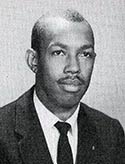Dr. William King
Dr. William King was born in Oklahoma City, Oklahoma in 1941. He received a bachelor’s degree from Oklahoma City University and completed his medical degree at Howard University College of Medicine in 1968.
Following medical school, Dr. King joined the U.S. Public Health Services (PHS). He had finished
medical school during the Vietnam War, and the PHS offered him an opportunity to join a uniformed service dedicated to the benefit of the public without joining the military.
Dr. King completed his residency in anesthesiology at the PHS hospital in Seattle, Washington. He also completed a fellowship on respiratory diseases the following year.
After serving as the director of the anesthesia and surgery department at and as associate director of a PHS facility in Seattle, Dr. King became the director of the PHS hospital in Nassau Bay, Texas. He was the first African American to serve as a hospital director in the history of the PHS.
The PHS presently consists of all agencies of the Health and Human Services Department along with its Commissioned Corps. The organization traces its roots to the treatment of injured seaman in the early nineteenth century and to a loose network of locally controlled federal hospitals later in that century. The increasing involvement of the organization in public health issues led to it being renamed the Public Health Service in 1912.
In its history, the PHS has addressed concerns surrounding infectious diseases, immigration screenings, and immunization programs, among other issues. Despite its past involvement in the notorious Tuskegee experiment, the PHS has provided medical care to historically underserved constituencies such as American Indians, Alaskan Eskimos and African Americans. According to Dr. King, the PHS Commissioned Corps provide a uniformed service, whose members “carried syringes and stethoscopes instead of weapons.”
When the PHS closed its Division of Hospitals in November 1981, Dr. King joined the faculty at the University of Texas Medical Branch at Galveston (UTMB). He served as faculty there from 1981 until November 1997. Currently he works as an adjunct professor at UTMB in the Department of Anesthesiology. His accomplishments at UTMB include starting the Minority Faculty Council to begin the dean and vice president his goal is to “carry the voice of minorities” at UTMB.
Dr. King remains an active leader of Boys and Girls clubs in Houston. In addition to memberships in anesthesiology professional organizations, he served as vice president for one term and continues his membership with the Houston Medical Forum.
Next Biography: Dr. H.E. Lee
Return to: Attracting Top African-American Physicians


